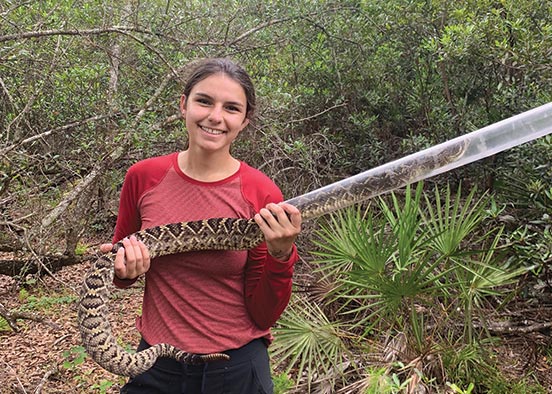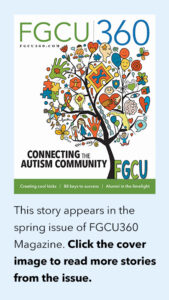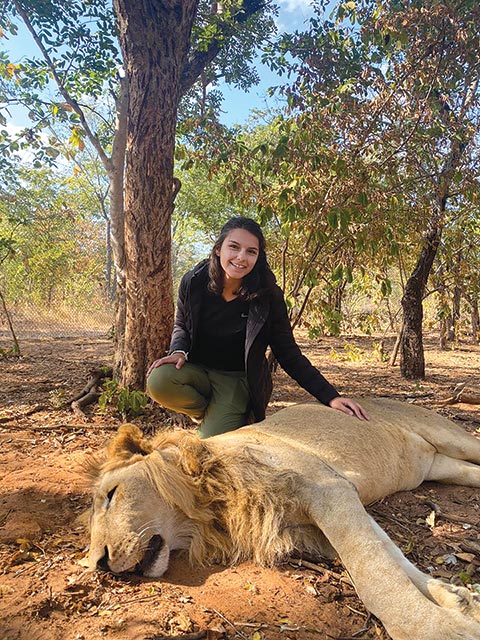Growing up in rural Rhode Island, Ella Guedouar lived on a dead-end road with hundreds of wooded acres that seemed to call her name.
She knew the woods like the back of her hand and treasured all four versions of it as it changed with the seasons: the “tree graveyard” where she was guaranteed to find turkeys and a small pond with weird red mushrooms growing on the trees by the banks. The late summers would yield what seemed like millions of tiny Eastern American toads. She would grab her biggest bucket and collect as many as she could find. Her neighbor noticed, and every time he cut the grass, he would bring her the biggest toad he could find.

She spent a lot of time just watching animals: the deer that crossed through the playground of her backyard; the coyotes that ate the food her neighbors would leave out; and the birds eating the seeds that her dad had just planted in the lawn.
 There came a time when she wanted to run away and live in the woods, bringing only a bag of chocolate chips with her. Wildlife and nature were that captivating to her.
There came a time when she wanted to run away and live in the woods, bringing only a bag of chocolate chips with her. Wildlife and nature were that captivating to her.
“I used to mistake my love for animals as just a hobby and wanted to pursue something that seemed more mysterious and difficult than ‘just animals,’ ” she says. “As a kid, when you think of a career that deals with animals, your options are limited to a zookeeper and a vet. There wasn’t much discovery involved. Or so I thought.”
After her family moved to Florida in 2018, she entered FGCU as a dual-enrolled student at age 16 – meaning she was still in high school but attending college and earning college credits. She chose to major in psychology to study the human mind and how it functioned. What drives people to do what they do? She wanted to understand.
While taking the required course “Foundations of Civic Engagement,” she decided to do something untraditional – and uncomfortable. Instead of choosing a project related to her major, she joined the pre-vet students in volunteering at Octagon Wildlife Sanctuary in Punta Gorda. She figured she might as well explore something before she committed to psychology for the rest of her career.
She immediately fell in love with the animals and continued volunteering there for two years after the project concluded. She began to question the original path she had set for herself. She scheduled a meeting with Associate Professor Billy Gunnels, director of Scholarly Innovation and Student Research, to help her gain research experience in her final year before graduating.
Her plan was to go big: She wanted to create her own project and write it up to submit and defend as her honors thesis. She got the idea from her “Human Memory and Cognition” class, where a vervet monkey was used as an example for language use in animals. And a vervet monkey named Ross happened to be at Octagon.
Gunnels told her about ethology, or animal behavior, and that was an a-ha moment. She realized it combined the two things she loved the most: psychology and animals. When she learned that Gunnels was an ethologist, she pestered him to take her on as his research student.

“I said, ‘No, I don’t think that’s going to happen,’ ” Gunnels says. “She wanted to work on a project with this vervet monkey. I was sort of resistant, and she kept coming back with more information, better information and clearer information to make the argument that this was a good idea and she should do it.
“I’ve noticed a lot of students who have passion. And then I’ve noticed a lot of other students who are very inquisitive. Ella combines those two things with a third trait that separates her: She gets things done. There are a number of students who are really good at asking questions, and that’s great. And there are a lot of students who are very enthusiastic. Ella was able to take both of those things and combine it with the ability to start something and see it through to completion. It was really impressive.”
Guedouar designed a study looking at innate referential language recognition in a socially isolated monkey using alarm calls. After a year of hard work, she successfully defended her Honors College thesis just before graduating, and presented her research at an international conference hosted by the Animal Behavior Society. Her paper is now in the process of publication in the first edition of the Florida Undergraduate Research Journal.
She plans to complete her master’s in environmental science in 2023, then do her doctoral research in Africa, focusing on human-wildlife interactions or interspecies interactions. Her main goal is to connect all of her research back to conservation and take every opportunity to advocate for wildlife.
“Animals are so much more complex than we think,” she says. “Like us, there are reasons they do the things they do, and I want to figure out why or how. Animals can’t tell us what they’re doing or why they are doing something, which makes this field that much more difficult. They are so diverse and mysterious and there is so much left to discover, but for some animals, it’s a race to save them from us.
“We tend to heavily focus on cute, fuzzy animals like pandas and lions and forget about or even despise the slimy, scaley or small animals, regardless of how important they may be to the functioning of an ecosystem. A lot of people don’t see first-hand the impact that their choices or lifestyles have on the environment, like the damage pollution does to our sea life or the wildlife that gets evicted because we want to build houses somewhere.”